Facts and Figures





With 3,439 employees tantamount to approx. 1,212 full-time equivalents, HSG is among the ten largest employers in the Canton of St.Gallen. Teaching accounts for 441 full-time equivalents, the institutes and executive education for 443, and services for 328. Fifty-nine per cent of the regular members of staff live in the region. The University also employs 14 trainees in five different trades.
The University’s Board of Governors, which is appointed by the cantonal parliament, is the HSG’s supreme body. It is chaired by the cantonal education minister. The supreme academic body is the Senate. Its membership is made up of
full professors, members of the non-tenu red faculty, as well as student representa tives. The University is headed by the President.
F.l.t.r.: Adrian Sulzer, Thomas Zellweger, Urs Fueglistaller, Karla Linden, Monika Kurath, Peter Lindstrom, Bernhard Ehrenzeller, Martin Eppler, Hildegard Kölliker, Marc Meyer, Bruno Hensler, Ulrich Schmid.
The University of St.Gallen is headed by the President. The President is Prof. Dr. Bernhard Ehrenzeller. The Vice-Presi dents are Prof. Dr. Martin Eppler (Studies & Academic Affairs), Prof. Dr. Urs Fueglistaller (Institutes & Executive Education), Prof. Dr. Ulrich Schmid (External Relations) and Prof. Dr. Thomas Zellweger (Research & Faculty).

According to the University Statutes, the President’s Board consists of the President and the Vice-Presidents, and in addition the General Counsel (Hildegard Kölliker), the Director of Administration (Bruno Hensler) and the Dean of Studies (Marc Meyer). The
President may co-opt further members of the University. At present, these are the Director of Research & Faculty (Monika Kurath), the Director of Institutes and Executive Education (Karla Linden), the Director of External Relations (Peter Lindstrom) and the Head of Communication (Adrian Sulzer).
The University of St.Gallen runs the following schools:
School of Finance (Prof. Dr. Roland Füss)
School of Economics and Political Science (Prof. Dr. Reto Föllmi)
School of Humanities and Social Sciences (Prof. Dr. Caspar Hirschi)
School of Computer Science. (Prof. Dr. Barbara Weber)

School of Management (Prof. Dr. Reinhard Jung)
Law School (Prof. Dr. Bardo Fassbender)
The schools ensure the fundamental mission in teaching, research and executive education. Besides the schools, the institutes, research centres and centers have an important and strong function at HSG. They work in research and executive education and provide services in research, consultancy and expert opinions.
Executive education is offered by the Executive School of Management, Technology and Law (ES-HSG) and by the institutes. The ES-HSG has been conceptualised as an institute with special tasks for the University as a whole. Its executive education programmes are intended to contribute to the HSG’s good reputation. It provides financial support to the University’s overall budget.
1911

The Canton of St.Gallen is HSG’s sole funder
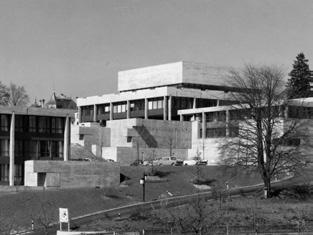

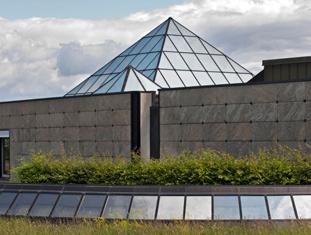
Change of name to Commercial College and move to a new building in Notkerstrasse 20
Move to the Rosenberg and change of name to St.Gallen Graduate School (HaSG)




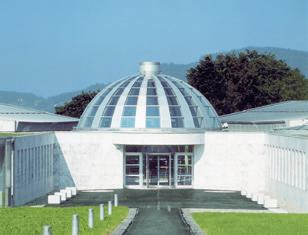
Establishment of the University of St.Gallen as a Business Academy in the west wing of the Burggraben Cantonal School
Attainment of doctoral degree awarding powers
HSG is the first Swiss university to set up an executive education level
Inauguration of the HSG library building
Inauguration of the Executive Campus HSG Change of name to University of St.Gallen (HSG)
Extension of the Executive Campus HSG with an additional seminar tract and seminar hotel
introduction of Process

Inauguration of the learning and research facility at Tellstrasse 2, near the central railway station


With a majority of 86%, the voters of the Canton of St.Gallen approve the new Joint Medical Master programme at HSG. This has provided places for 40 students since the autumn semester of 2020

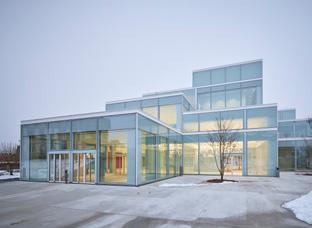
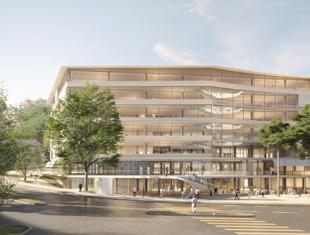

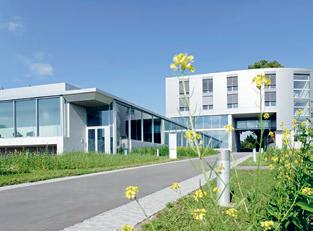
HSG decides on the winning project of the architectural competion for the Platztor Campus
Inauguration of the new teaching and research building in MüllerFriedberg-Strasse 6/8
Inauguration of the School of Computer Science
With a majority of 63%, the voters of the Canton of St.Gallen approve the project of building the Platztor Campus
Inauguration of SQUARE under the motto “The Beginning”
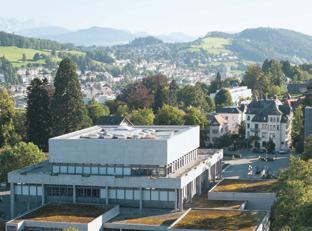


The compact campus, the short distances and a modern infrastructure support students in their individual or joint learning efforts and in their everyday life at the University.
The policy of progressing from printed matter towards digitalisation is being pursued further: in addition to the more than 565,000 printed books, journal volumes and non-books (DVDs audiobooks, CDs) and more than 750 printed journals, the University Library provides access to more than 300,000 e-books and 110,000 e-journals. The Library is in particular demand as a place for learning: 537 workstations are available, ten of which are reserved for doctoral students and 30 for students who are working on their Master’s thesis. The Library is a public library and makes its collections, workstations and services available free of charge to anyone who is interested –including the general public.
Unisport offers students and staff of the University a wide range of sports. About 3,000 participants in the weekly training sessions in the HSG Sports Hall – excluding participants in external sports facilities – prove that exercise and sports are accorded a high value on campus. About 300 weekly training sessions in more than 90 sports are evidence of the wide range of sports on offer. Tournaments in football, tennis, basketball, floorball and volleyball and further sports are as popular among students as day trips, camps and workshops. Participation in national and international university tournaments does not only ensure athletic challenges but results in interesting contacts above and beyond the world of sports.
Art became a fixed component of university life at HSG a long time ago: it has been integrated and has been engaged in a dialogue with the architecture from the very start. With more than 50 works of art by artists such as Gerhard Richter, Alicia Penalba, Hans Arp, Alberto Giacometti, Georges Braque, Joan Miró and Tony Cragg, the University of St.Gallen owns an impressive collection of modern art, which is accessible to the public. The Art@HSG app, which was developed by the Art Committee, is intended to provide students, staff and visitors with an opportunity to spontaneously obtain information about a work of art.



Due to the partial renovation of the Library Building, including a cafeteria, a modern infrastructure is available for the purposes of studying, conducting research or taking a break. In the privately funded new building SQUARE – an architectural flagship on the Rosenberg – the University of St.Gallen explores the future of learning and teaching. The planned new campus building at Platztor will move the University even closer to the city and make it more perceptible.
The Main Building of the University with sculptures by Alicia Penalba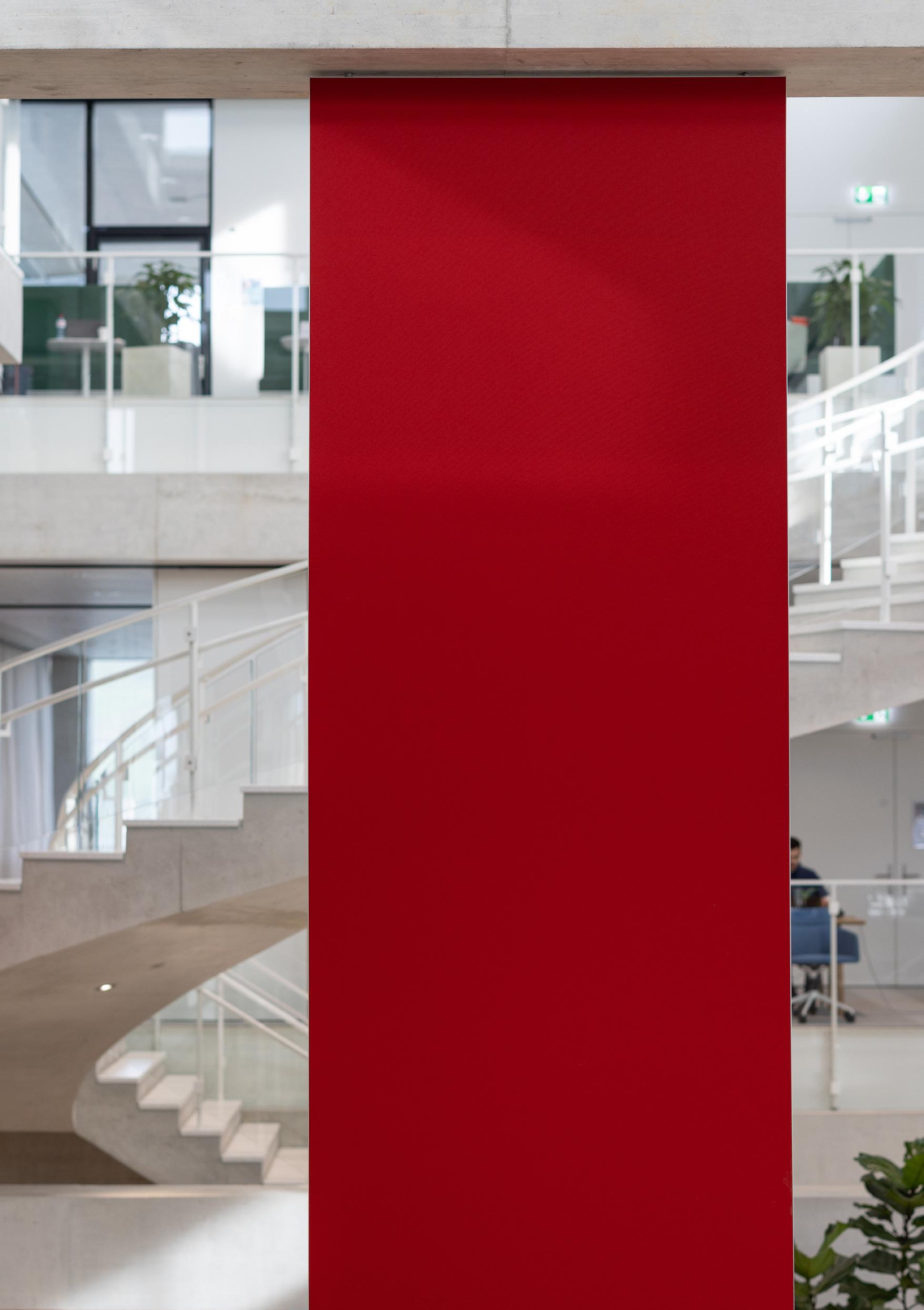
From 2020, the number of students at HSG rose from 9,047 to 9,291 in Autumn Semester 2021. The proportion of women is 35.7 per cent (preceding year: 35.7). The Assessment Year accounts for 1,925 (1,919) students, the Bachelor’s Level for 3,149 (3,033). 3,577 (3,443) students are enrolled at the Master’s Level, and a total of 597 (617) at the Doctoral Level. Another 43 (35) students are attending supplementary courses.
Assessment Year 60 ECTS-Credits
Bachelor’s Studies (B.A. HSG) 120 ECTS-Credits
Specialisation Economic Sciences Business Administration (BBWL) Economics (BVWL)
International Affairs (BIA)
Law Sciences and Economics (BLE)
Law teaching programme in Law & Economics (für BLE)
Specialisation Law Sciences Law Science (BLaw)
Specialisation Computer Science
Bachelor of Science (B. Sc. HSG) Informatik (BCS) (180 ECTS-Credits)
Bachelor of Medicine UZH (180 ECTS-Credits): St.Galler Track
All majors (excluding BCS)
Business Innovation (MBI)
Marketing Management (MiMM)
Accounting and Finance (MACFin) General Management (MGM)
Economics (MEcon)
special approval procedure
Strategy and International Management (SIM)
Management, Organization Studies and Cultural Theory (MOK)
Banking and Finance (MBF)
International Affairs and Governance (MIA)
Quantitative Economics and Finance (MiQE/F)
International Law (MIL)
Law and Economics (MLE)
Law (MLaw)
Master of Science (M.Sc. HSG): Computer Science (MCS) (120 ECTS-Credits)
Master of Medicine HSG UZH (180 ECTS-Credits): Joint Medical Master (St.Galler Track)
Management (PMA)
Dr. oec. HSG with specialisation in: Accounting (English) Business Innovation (German) General Management (English) Marketing (German)
Graduate Programme in Economics and Finance (GPEF) Dr. oec. HSG with specialisation in: Economics Econometrics Finance
International Affairs and Political Economy (DIA) Dr. rer. publ. HSG
Organization Studies and Cultural Theory (DOK) Dr. rer. soc. HSG
Law (DLS) Dr. iur. HSG
Computer Science (DCS) Dr. sc. HSG
German English German and/or English alternatively possible
Learning success
2017 2018 2019 2020 2021
B.A. graduates 71% 81% 74% 79% 77% M.A. graduates 88% 84% 80% 84% 82% Doctoral graduates 85% 87% 80% 89% 82%
B.A. graduates 86% 86% 79% 85% 81% M.A. graduates 87% 85% 84% 83% 87%
Doctoral graduates 86% 84% 78% 71% 82%
Assessment by students: number of positive assessments, 2017-2021
Basic levels 2016 2017 2018 2019 2020
Economic sciences 38% 39% 39% 39% 40% Legal sciences 5% 7% 7% 7% 7%
Political sciences 16% 18% 19% 18% 18%
Economic sciences 56% 59% 51% 51% 49% Legal sciences 12% 10% 9% 8% 6% Political sciences 8% 16% 4% 12% 9%
Swiss market shares of HSG graduates, 2016-2020 (latest survey from 2020)
When HSG students take up their studies, they are entrepreneurs on their own behalf: they plan and conceptualise their studies themselves – and this requires a high degree of personal initiative.
80 per cent of Bachelor’s graduates and 97 per cent of Master’s graduates have more than six months’ professional/ practical experience when they graduate (including internships).
89 per cent of Bachelor’s graduates and 77 per cent of Master’s graduates already have a regular job when they graduate. 62 per cent of Bachelor’s graduates and 60 per cent of Master’s graduates were able to choose from among a minimum of 2 job offers.
In 2021, 614 national and international companies published a total of 2,124 job advertisements. Among them were 103 companies from the region, which had published 241 advertisements.
platform hsgcareer.ch
Besides purely specialist knowledge, studies at HSG focus on personal development.
HSG's system design with its Bachelor’s and Master’s degree levels, that was conceptualised in the wake of Bologna Process, places the major focus on the idea of assuming personal responsibility. According to the motto “One day, we’ll leave the HSG which we have helped to shape”, many students are members of one of about 130 associations and initiatives. Despite the great demand that the degree courses make on students’ time, almost half of all students at the Bachelor’s and Master’s levels are actively involved. The St.Gallen Symposium, which has been organised by HSG students every year is a case in point.
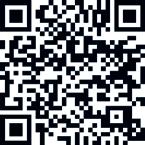

Every year, numerous events such as the St.Gallen Symposium, the conference of the start-up scene, START Summit, or the oikos conference take place in St.Gallen, which originate from student initiatives. In addition, the University of St.Gallen is not only an educational institution and a venue for events but also organises conferences and congresses itself about a wide variety of topics such as management, energy, marketing, business IT, law, logistics and corporate governance.
B.A. graduates
graduates
graduates
Involvement in an HSG student organisation, 2017-2021
HSG Alumni is the official alumni organisation of the University of St.Gallen. Since 2017, the number of HSG Alumni members has risen from 27,722 to 33,973. HSG Alumni is regarded as
one of Europe’s largest and most professional alumni organisations. Itsvision reads: “Creating benefit, networking and funding.”
35’000 30’000 25’000 20’000 15’000 10’000
Development, Alumni members, 2017-2021 Since 2019, there has been a new membership model, which makes all HSG students from the Master’s level upwards members when they start their studies.

Besides providing first-degree education and conducting research, the University of St.Gallen also regards executive education as one of its central functions.
Today, HSG generates an annual turnover of CHF 50.3m with executive education. Executive education is provided by the institutes and the Executive School of Management, Technology and Law (ES-HSG).
The HSG institutes organise executive education courses in their respective specialist fields for regional, national and international target groups. The range of diploma and certificate programmes and seminars covers requirements in the areas of economics, management, law, humanities and political science.
The Executive School (ES-HSG) is the contact for executive education at HSG and offers its own wide-ranging portfolio of degree programmes and courses in the field of Law & Management and Open Enrolment. In addition, the ES-HSG incorporates the Henri B. Meier School of Entrepreneurs, as well as company-
specific executive education programmes for national and international customers.
Total number of participants in executive education courses in 2021: 1,716*
It is primarily the Financial Times rankings that are of central importance to HSG; they are internationally significant and at the same time correspond to the University’s range of activities in teaching and executive education.
In the Financial Times rankings, the University defended its top-ten placement in the European Business Schools Ranking, in which the positions in five individual rankings are aggregated.
Financial Times Ranking 2017 2018 2019 2020 2021
European Business Schools 4. 4. 4. 7. 6. Masters in Management 1.(SIM) 9.(CEMS) 1.(SIM) 9.(CEMS) 1.(SIM) 8.(CEMS) 1.(SIM) 9.(CEMS) 1.(SIM) 9.(CEMS)
Masters in Finance 9. 6. n.a. 6. 6. Executive Education 16. 15. 16. 18. n.a
Full-Time MBA 19. 15. 17. 18. 18. ExecutiveMBA 22. 24. 20. 26. 21.
Ranking results for graduate and executive education programmes of the Financial Times rankings, 2017-2021. The European positions are indicated.
The activities of the University of St.Gallen have an impact both within and beyond the regional borders. Reports appear in local, regional, national and international media on a daily basis.
In 2021, approx. 13,000 media reports referring to HSG were realised both at home and abroad – mainly in Germany, Austria, the UK, Singapore and Brazil. A special mention is also deserved by the live interviews with HSG experts, which have been made possible by a camera on the campus since 2015. The camera is based on a satellite system and can thus be linked up live to news channels around the globe. This means that
on average, HSG experts can be seen in predominantly international media about every two weeks. This was achieved thanks to increased support provided by faculty members and researchers, but also owing to new services and a greater output provided for regional, national and international media professionals.
2017 2018 2019 2020 2021
National media presence, Total number of articles 9852 9936 9612 9017 9275 of which outside the St.Gallen region 8359 9082 8467 8028 7990
International media presence in the focal countries 4286 2371 3801 4581 3994
National and international media presence of the University of St.Gallen, 2017-2021, Argus, APA, Genios&LandauMedia, Gorkana, Grayling.
The University of St.Gallen has been active on social platforms since 2012. During the last few years, coverage has been distinctly boosted on all channels.
The University of St.Gallen has been communicating with its various target groups in the social media Facebook, Twitter and YouTube since 2012. Since 2014, HSG has also been present on Linke dIn and Flickr. In 2016, it extended its channels through Instagram. Since 2020, there have also been several podcast formats.
2019 2020 2021
Website visitors 1,405,152 1,642,714 1,815,002
YouTube video views 3,159,187 3,738,489 4,189,638
LinkedIn followers 65,971 75,892 88,790
Twitter followers 8881 9739 10,513
Instagram followers 8648 12,215 15,289
Facebook fans 26,689 27,150 27,399
Flickr photo views 33,405 34,511 35,142
Podcast downloads n.a. 3549 32,789
Development of the website and social media channels, 2019-2021.

We develop internal and external knowledge, which we make available to our stakeholders in a trailblazing and appealing form.
The schools (School of Management, School of Finance, School of Economics and Political Science, Law School, School of Humanities and Social Sciences and the School of Computer Science) employ 108 professors (number of employees as at 31 December 2021).
In addition, there are three global centers: Global Center for Customer Insight (GCCI)
Global Center for Entrepreneurship and Innovation (GCE&I) Global Center for International Economic Analysis (GCIEA)
HSG is characterised to a significant extent by its approx. 40 institutes, research institutes and centers. The institutes, whose organisation is largely autonomous, are self-financing but are closely involved in the work of the University. About 80 per cent of the full professors are part of an institute or a research centre. The institutes constitute amalgamations of subject-related chairs
and thus pool their competences under one roof. Besides basic research, they allow for an education of practical relevance, research and executive education. On this basis, the institutes, research institutes and centers make a substantial contribution towards the HSG’s self-funding rate of approx. 50 per cent.
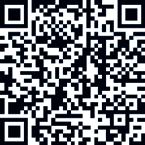
Besides basic research, HSG has always conducted practice-related research. This also finds expression in the strategic cooperation ventures with reputable practice partners.
SBB Lab, since 2010
Cooperation with the Swiss Federal Railways (SBB); deals with issues of transport services, particularly the challenges of the service and transport management between government and the market with a focus on railways.
BMW Group, since 2011
Cooperation with BMW deals with questions regarding the “Customers/ Premium/ Marketing” field of research. This cooperation venture aims to inject the latest findings of research and science into various areas of marketing and product design.
Bosch Lab, since 2012
Cooperation with Bosch; is intended to find and test business models in the “Internet of Things and Services” (IoTS). In addition, HSG and Bosch work on the
development of internet-based products and services.
Cooperation with Hilti develops new controlling systems and management models. Findings from behavioural science are used to further develop management and controlling systems.
Research cooperations

With the research platform Alexandria, HSG has pursued the aim of granting free access to as many HSG research results as possible since 2004.
However, Alexandria does not only serve as an archive for publications but also offers researchers and anyone else who is interested numerous additional services: reports on on-going research projects, personal profiles of academics and the latest research news and statistics. Working papers, newspaper articles and contributions to debates through Alexandria also furnish insights into current
research projects. In 2021, the platform comprised about 51,700 publications, of which 33 per cent are openly accessible directly on the platform.
The University of St.Gallen sensitises, encourages and supports HSG members in the preparation and implementation of start-up projects with an extensive range of various funding instruments.
Startup@HSG is part of the Center for Entrepreneurship. In 2021, more than 400 start-up consultation meetings were requested. Startup@HSG organises events for start-ups und fledgeling founders on the campus every semester in order to achieve optimal sensitisation for entrepreneurship and its encouragement.
Startup@HSG also has something to offer with regard to infrastructure: thus start-up offices in the TheHub building can be rented at attractive terms and conditions, and in the Main Building, the MakerSpace is available for workshops, brainstorming and prototyping. In addition, Startup@HSG awards the title of Entrepreneurial Talent to ten promising students every semester. These “talents” are rewarded with CHF 4,000 each for the development of an idea and will be intensively supervised and coached by Startup@HSG for the duration of a semester. After the corona hiatus, the HSG Entrepreneurial Champions programme is also being resumed: every year, five HSG start-ups will be able to travel to a start-up hotspot abroad in order to attend an entrepreneurial bootcamp there. The issue of co-founding is also being taken into account with immediate effect: as from 2022, Startup@ HSG has introduced a new service called Co-Found HSG. Here, future entrepre-
neurs of HSG are intended to find co-founders at an early stage. In close cooperation with the student organisations such as START and HSG partners such as HSG Alumni, Startup@HSG aims to promote entrepreneurship at HSG and integrate it as a fixed component of the HSG culture.
People who have successfully founded a company or have been working on a specific start-up project for a minimum of twelve months can apply for the spin-off label of the University of St.Gallen. Requirements include the stipulation that at least one of the founders is connected to the University of St.Gallen (HSG) and that a transfer of knowledge has taken place from studies, research or work. The label was launched in summer 2017. To date, more than 160 enterprises have been certified with the spin-off label.
Startup@ HSG
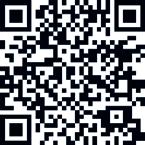

HSG has extended its international network during the last few years. The network now includes approx. 220 renowned universities worldwide. In 2021, HSG welcomed 693 students for a guest semester in St.Gallen. The number of HSG students spending an exchange semester at a guest university amounted to 896. 52 per cent of the undergraduates and 48 per cent of Master's students at HSG spend at least one semester in a foreign country.
All in all, students from some 90 nations are enrolled at HSG.
In today’s global economic and educational world, specialist qualifications must be complemented by an understanding of other cultures. With a high degree of cultural diversity on its Campus, HSG enables students to already experience internationality in their everyday university life. To be able to ensure a good numerical balance between Swiss and foreign students, the proportion of foreign students has been limited to a maximum of 25 per cent.
At HSG, about 48 per cent of full professors are of foreign origin.

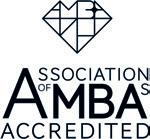

The University of St.Gallen is one of the frontrunners in the field of business education. This is confirmed by international seals of approval. HSG has been accredited with EQUIS since 2001, with AACSB since 2003 and with AMBA since 2019. It thus bears the most important international seals of approval for business schools. Only about 90 universities worldwide have these three accreditations and thus the so-called “triple crown”.
HSG exchange programmes

The University of St.Gallen maintains existing partnerships with, and is a member of:
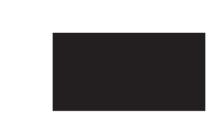
CEMS – The Global Alliance in Management Education


PIM – Partnership in International Management
APSIA – Association of Professional Schools of International Affairs
GBSN – Global Business School Network
PRME – United Nations Global Compact
In addition, HSG encourages student exchange with other universities. At the Master’s level, double degrees are possible with:
CEMS-Allianz
ESADE, Barcelona, Spanien
Fletcher School, Tufts University, Boston, USA
Fundação Getulio Vargas, São Paulo, Brasilien
HEC School of Management, Paris, Frankreich
INCAE Business School, Costa Rica Institut d’Etudes Politiques (Sciences Po), Paris, Frankreich Nanyang Technical University, Singapur
RSM Erasmus University, Rotterdam, Niederlande Stockholm School of Economics, Schweden Università Commerciale Luigi Bocconi, Mailand, Italien
Yonsei Graduate School of International Studies, Seoul, Korea Universidad de los Andes in Bogotá, Kolumbien
Besides German as the official and cultural language, English – the language of business – is increasingly being integrated into the range of degree courses with the aim of achieving bilingualism among our students.
In German and/or English are offered:
Assessment Year (English-track option)
3 majors at Bachelor's level (German and English)
9 Master's programmes; starting from autumn 2022 also hybrid programmes (English)

7 doctoral programmes (English) 49 executive education programmes (English)
The University of St.Gallen has been offering public lectures ever since it was established. Due to the COVID-19 pandemic situation in the years 2020 and 2021, all lectures had to be delivered online. In this way, more than 3,500 (3,651) people were able to listen to the total of 60 lectures despite the pandemic.
The University of St.Gallen is involved in several local and regional networks and is a member of the following organisations:
benevol St.Gallen
DenkRaumBodensee
IHK –St.Gallen-Appenzell Chamber of Industry and Commerce

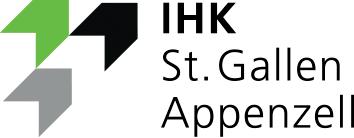

International Association of Lake Constance Universities (IBH)

IT St.Gallen rocks!
Kantonaler Gewerbeverband St.Gallen (KGV)

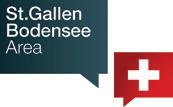
Quartierverein Nordost-Heiligkreuz Quartierverein Rotmonten
REGIO Appenzell AR − St.Gallen − Bodensee Rosenberg Quartierverein Startfeld – Innovation Network in the St.GallenBodensee Region St.GallenBodenseeArea St.Gallen-Bodensee Tourism Textilland Ostschweiz Wirtschaft Region St.Gallen (WISG)



In 2021, the University’s operating revenues amounted to CHF 264.1m. The government contribution of the Canton of St.Gallen has been fixed for the four-year performance period of 2019-2022. CHF 6.817m of this
Comparison in million CHF and per cent
contribution are earmarked for the medical studies in accordance with the separate performance agreement concerning the Joint Medical Master for the period of 2020-2022.
2017 2018 2019 2020 2021
Operating revenue HSG 239,8 245,6 251,3 247,4 264,1 Public contribution Canton 49,2 49,2 54,3 62 62 Public contribution Canton in % 20,51 20,02 21,62 25,07 23,48
Operating revenue, HSG, and public contribution, Canton of St.Gallen, 2017-2021, including Joint Medical Master.
Taking into account the government contribution towards the Joint Medical Master, the contribution made by the public purse per student
amounts to CHF 15,212, of which the Canton of St.Gallen pays CHF 6,677.
2017 2018 2019 2020 2021
Contribution public purse 14,222 14,191 14,710 15,338 15,212 Funding Canton of SG 5750 5673 6124 6857 6677
Contribution, public purse, per student, 2017-2021, including Joint Medical Master

The flagship project, which was complete ly funded through private donations, has been operational since the beginning of the spring semester of 2022. With donations totalling CHF 65m, SQUARE constitutes the biggest fund-raising endeavour in the HSG’s history. More than 1,100 donors made it possible for SQUARE to be realised. In SQUARE, the HSG Foundation has realised a trailbla zing project for HSG. In SQUARE, outstanding personalities from business, politics and culture meet students, faculty and alumni. SQUARE is a place of personal encounters for everyone who wants to engage in a constructive dialogue for the future of society and the economy. The HSG Foundation’s objective is the promotion of HSG in its develop -
ment as one of the internationally leading business universities. It initiates and pools funding activities in order to realise strategically important projects for HSG and thus contributes towards the safeguarding of excellence in research and teaching. hsg-stiftung.ch SQUARE
 Completely funded through private donations: the biggest fund-raising endeavour in the HSG’s history
Completely funded through private donations: the biggest fund-raising endeavour in the HSG’s history
Train connections at half-hourly intervals and the A1 motorway directly link St.Gallen with Zurich Airport and all Swiss major cities.
Publisher: University of St.Gallen (HSG)
Editorial staff: Communication University of St.Gallen (HSG)
Layout: Isabel Gekeler, Dominik Junker
Photos: Hannes Thalmann, University of St.Gallen (HSG)
Printed by: Typotron, St.Gallen
Copies: 500
Copyright: University of St.Gallen (HSG) 2022

The images in this brochure are detailed photographs of the newly inaugurated university building SQUARE.

New clips about exciting topics can always be found on our YouTube channel.
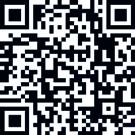

youtube.com/user/HSGUniStGallen
use.mazemap.com
University of St.Gallen (HSG) Dufourstrasse 50 9000 St.Gallen +41 71 224 22 25 kommunikation@unisg.ch unisg.ch
linkedin.com/university-of-st-gallen instagram.com/unistgallen twitter.com/HSGStGallen facebook.com/HSGUniStGallen
From insight to impact.